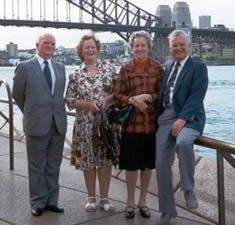
 |
The Curtin attraction - 'An insatiable appetite'Tom Fitzgerald had developed 'a slight interest' in Curtin during his years as Financial Editor of the Herald when he discovered that Curtin, like a number of other self-educated Labor parliamentarians from the working class, read a 'great deal of serious economic literature' including the works of Keynes. His interest grew as he 'went through the files of the weekly newspaper the Westralian Worker, not only during Curtin's editorship' from 1917 to 1928, but even before that time.
|
||||||||||||||||||||||||||||||||||||||||||||||
 |
Tom and Margaret Fitzgerald in Sydney with John Curtin's daughter, Elsie, and her husband Stan Macleod, 1986 John Curtin Prime Ministerial Library. Records of the
Fitzgerald family. Tom Fitzgerald, Margaret, Elsie, Stan; Sydney 1986.
JCPML00720/52 |
|||||||||||||||||||||||||||||||||||||||||||||
Tom Fitzgerald delivered the 1977 John Curtin Memorial Lecture An Education for Labor Leadership: the case of John Curtin at the Australian National University. In the lecture, he aimed to look at Curtin’s thinking on economics and relate it to his thoughts on the problem of human relationships in the Labor movement, what Curtin frequently referred to as 'The Human Element'.
He descibes as ‘absolutely predictable’ that Curtin would not go to secondary school, given the time, place and family circumstances, and provides a comprehesive picture of the world of educational (and other) opportunities provided by the Victorian Socialist Party (VSP) in Victoria in the early 1900s. The VSP was ‘a complete self-contained universe of social, educational and propagandist activity taking all the available times of their evenings and weekends’. Tom Mann was one of Curtin’s mentors and everything in his teaching ‘implied the necessity, the dedication and elevation of spirit and the overcoming of pettiness and human instincts to jealously and envy by the force of reason’. Mann wrote of the need for ‘moral training’.
On numerous occasions in his journalistic and editorial career, Curtin would write on the problem of personal relations within the Labor movement. Curtin also took advantage of Mann’s emphasis on education in economics.
To illustrate one example of ‘the measure of Curtin's success in putting his own precepts into practice in politics’, Fitzgerald links the two themes of ‘the grasp of economics and the conduct toward one’s fellow party members’ by relating the history of the relationship between Curtin and E.G.Theodore. Curtin had often publicised Theodore’s achievements as Premier of Queensland, and hailed his entry to Federal politics, calling him a future leader, but Theodore had had a decisive part in keeping Curtin out of ministry in 1929. Curtin nevertheless actively supported Theodore’s proposal, as Treasurer, to bring credit policy under government control. In the parliamentary debate on the Premiers’ Plan, Theodore interrupted Curtin’s speech, with sneering tone: ‘You’re becoming drunk with your own rhetoric.’ In reply Curtin explicitly refuses to stoop to personal slurs against a fellow party member (Theodore had recently been suspended from Cabinet over the Mongana corruption allegation). Curtin argued against Theodore on policy and principle alone, believing that Labor had ‘gone down’ on the reflationary policy it had only recently advocated in a by-election. Read the text of the complete lecture via the JCPML Electronic Research Archive. |
||||||||||||||||||||||||||||||||||||||||||||||
Fitzgerald noted that this advertisement from the Socialist for a public lecture by Tom Mann at the Bijou Theatre, 'The Brightest House in Melbourne', was 'V. good candidate for reproduction in book' Mann was to lecture on 'The Wonders of Science, A Mental Pilgramage to Europe, the East, Ancient Rome, Greece, Egypt and Babylonia.' A cordial welcome was extended to strangers - and attendees were reminded that they 'must be early to secure a good seat.' Socialist, 14 September 1907, page 2 |
||||||||||||||||||||||||||||||||||||||||||||||
|
As he continued his Curtin research, Fitzgerald recognised a kindred temperament in the young Curtin. He annotated an advertisement in the Socialist for a lecture by one of Curtin’s mentors, Tom Mann, with the comment 'Appealing to the ecstatic element in Curtin’s temperament?'. But Fitzgerald also noted here 'Yet Curtin was a shrewd realist also - bring out early'. Fitzgerald and Curtin shared some similar experiences and enthusiasms – Irish Catholic upbringing, early experience of a working class environment, love of English literature (especially Shakespeare), interest in economics (especially Keynes), interest in evolution, careers as journalist and editor. Fitzgerald’s empathy and respect for Curtin’s mind and character, combined with exceptional scholarship, led to new insights into Curtin the man and new interpretations of known evidence. Curtin’s love of Shakespeare is obvious in his letter of 9 August 1912, addressed to three of the Needham family: Abraham and Annie, and their daughter Elsie, Curtin’s future wife. Written on a Friday night, Curtin had just finished reading Frank Harris’ newly-published book The Women of Shakespeare and describes it enthusiastically. Fitzgerald interprets the letter as a lightly disguised declaration of love for Elsie Needham.
Tom Fitzgerald planned to write a biography of John Curtin but became so enmeshed in his investigations that the work was still in progress when he died in 1993. He wrote to Peter Ryan, ‘I’ve an insatiable appetite for ..morsels of actuality’ [6] and his investigative journalist’s concern for thoroughness and accuracy have ensured that his research papers on John Curtin are of great interest and significance. Footnotes1. John Curtin Prime Ministerial Library. Records of the National Library of Australia. Interview of Tom Fitzgerald, 01/02/1988 - 3/09/1988. JCPML00658/1. Original held by National Library of Australia TRC 2247 2 - 4. John Curtin Prime Ministerial Library. Records of the Australian National University. An Education for Labor Leadership: the case of Curtin, by T M Fitzgerald, 1977. JCPML00420/2 5. John Curtin Prime Ministerial Library. Records of Tom Fitzgerald. Curtin and Shakespeare, 1909 - 1979. JCPML00653/320 6.John Curtin Prime Ministerial Library. Records of Tom Fitzgerald. Letter from Peter Ryan to Tom Fitzgerald, 2 March 1977. JCPML00653/28/7 - check this reference
|
||||||||||||||||||||||||||||||||||||||||||||||